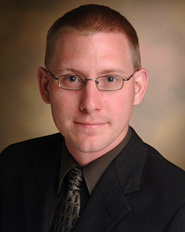
Alan Theisen (b. 4 October 1981; Port Huron, Michigan) is a Ph.D. graduate assistant in the Department of Music Theory at the Florida State University.
Composing since the age of sixteen, he has produced a steadily growing body of work distinguished by its musical energy and concentration of expression.
Representative works by Theisen include a Sonata for Alto Saxophone and Piano, Variations on a Theme of Gretchaninov, Eclogue for flute, and the Concerto for Alto Saxophone and String Orchestra (premiered by soloist Lawrence Gwozdz and the Szczecin Philharmonic in 2004). Recent compositions and commissions include Ritorno for flute and cello and a Triple Concerto. Noted composer Dimitri Terzakis commends Theisen's oeuvre as being "the product of a unique talent."
As a saxophonist, Theisen has toured the United States and Canada with the Sax-Chamber Orchestra, performing at two World Saxophone Congresses (Montreal - 2000, Minneapolis - 2003). He studied the instrument with internationally-recognized performer Lawrence Gwozdz and participated in masterclasses with famed saxophone pioneer Jean-Marie Londeix. No stranger to the podium, Theisen has been a guest conductor with several ensembles.
In an effort to showcase both his own original compositions and pieces by other contemporary composers, he founded the Intégrales New Music Festival in 2005. Now an annual event, Intégrales NMF features world-premiere performances by nationally recognized musicians. Intégrales has expanded to include musical collaborations with artists, authors, and dancers.
Theisen wrote his undergraduate thesis on György Ligeti's Piano Etudes, and has authored several papers on topics including Elliott Carter, film editing, composition as analysis, and Michael Brecker.
Other interests include mathematics, film criticism, and philosophy; in addition, Theisen has performed the role of Oberon in a production of Shakespeare's A Midsummer Night's Dream, for which he also wrote the incidental music.
Theisen lives with his wife (and puts up with their two cats) in Tallahassee, Florida.
|
|
|
|
|
|

Monday, July 04, 2005
My Country Tis of Thee
The question of American music invades my conscience every Independence Day. Why do we equate Copland's (or Copland-ish) compositional style with genuine American sonorities? Why do sustained pedals of open fourths, soaring trumpet melodies of leaping fifths, diatonic flute musings, and mild bitonal harmonies evoke humble images of apple pie, baseball, grandma's garden, and Old Glory flapping in the breeze?
Why, unfortunately, has this become the calling card of "American" music?
Why not Ives, Parker, MacDowell, or Beach? Ah, because we were too busy playing Brahms and Dvorak for the umpteenth time to stop and realize we weren't cultivating our own musical seeds. Our orchestras ignored the talent growing in our own backyards during the first half of the 20th century (Ives wasn't thoroughly explored until the 1960's).
(Oh, and anther thing - Dvorak's "New World" Symphony is not, nor ever will be, American music. Period. End of story. The next time I read something about Dvorak's piece "ushering in the American symphonic style", I'm going to go insane.)
Why not jazz? Obviously...because it was a tradition rooted in African-American entertainment. Sure, Copland and others infused some of their works with major/minor triads and flat sevenths, but just enough to tickle the fancy of white-bread WASPs and create a comfortable scandal.
Why Copland? Titles. Without such evocative titles like Billy the Kid, Appalachian Spring, Rodeo, Lincoln Portrait, et al., would we associate this music with anything other than Copland? I say: probably not. Throw a well-marketed "American" title on a piece with catchy tunes and harmonies anyone with a 7th-grade listening ability can understand and presto!...American music. (On the other hand, what could be more American than advertising and Populism?) Please understand I am not marring Copland's good name! I'm just angry that we associate a select few of his scores (and not necessarily his best ones) with the American sound. How do we know Copland? Not the quirky First Symphony, the masterful Piano Variations, or the wrenching Vitebsk, but... "Beef - It's what's for dinner".
I absolutely love Billy the Kid, but since countless commercials, film scores, and cheap imitations have flooded our collective consciousness, how can we hear it with fresh ears, i.e. not as a piece of "Americana", but simply as a ballet?
To me, Appalachian Spring captures the essence of America about as well as the Hebrides Overture epitomizes Scotland. I believe that the very plurality of America may mean that we will never have a definitive "American" sound. Perhaps that is what truly distinguishes us - a musical melting pot.
Oh, well. I'm to celebrate the Fourth by listening to Ives. And Carter. And Varese and Reich and Barber and Gershwin and Riley and Ellington and Beach and Creston and Babbitt and...
posted by Alan Theisen
Sunday, July 03, 2005
Queer Eye for the 12-Tone Guy
I guess this article proves my theory: If you use triads, you really are gay.
I'm glad I'm a heterosexual - I wouldn't trade my lust for dissonance for anything!
(N.B. In case you missed it, the above comments drip with sarcasm.)
I like how Schoenberg created music based on "mathematical formulas rather than sound". Ho, ho! I'm sure Arnold would disagree! Xenakis, maybe....but not Schoenberg. Perhaps a certain reporter should have stayed awake during music history class.
Some people should not be allowed to write about music. Or procreate. Or breathe.
On another note, have a very happy Fourth of July. Remember - you can't have "patriotic" without "riot".
posted by Alan Theisen
|
| |



